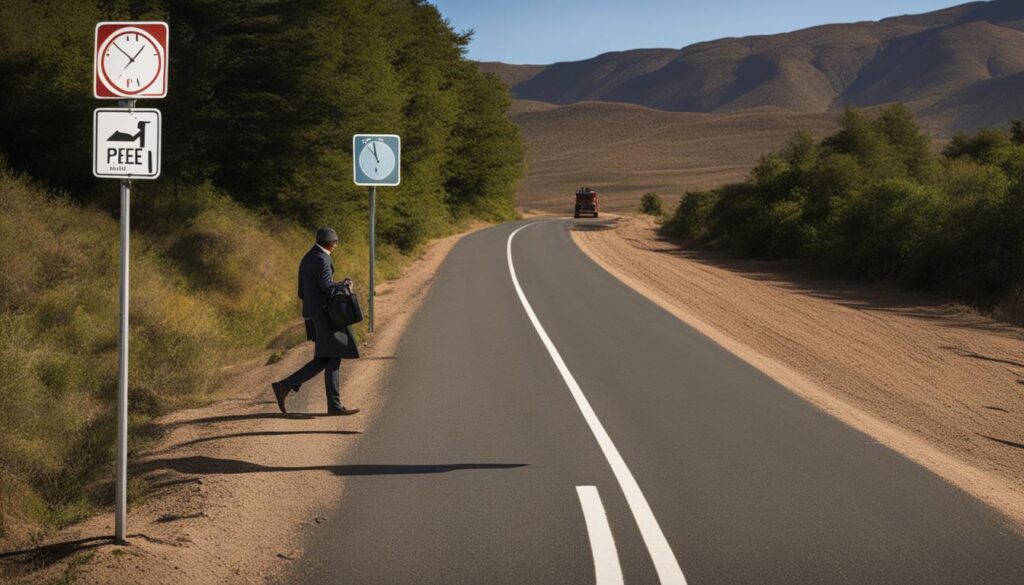Welcome to my article on navigating the Transport Service Licence (TSL) process in New Zealand. If you’re looking to obtain a TSL licence for commercial activities involving motor vehicles, you’ve come to the right place! In this article, I will provide you with valuable information and insights to help you understand the TSL licence requirements and application process.
Key Takeaways:
- Transport Service Licence (TSL) is an additional licence required for commercial activities involving motor vehicles in New Zealand.
- TSL comprises of five other licences, including the Rental Service Licence, Goods Service Licence (GSL), Small Passenger Service Licence, Large Passenger Service Licence, and Vehicle Recovery Licence.
- GSL is necessary for individuals or companies involved in delivering goods using vehicles with a gross vehicle mass of 6000kg or more.
- Understanding the Chain of Responsibility is crucial, as it holds all individuals accountable for compliance with traffic rules and laws.
- TSL licence applicants should ensure they meet the eligibility criteria, provide accurate documentation, and navigate the application process effectively.
What is a Transport Service Licence (TSL)?
A Transport Service Licence (TSL) is an additional license issued by the New Zealand Transport Agency (NZTA) that complements a standard driver’s license. It is a vital requirement for individuals and companies involved in various commercial activities in New Zealand.
The TSL is divided into different categories, each catering to specific commercial activities. These categories include:
- Rental Service Licence
- Goods Service Licence (GSL)
- Small Passenger Service Licence
- Large Passenger Service Licence
- Vehicle Recovery Licence
These licenses allow individuals and businesses to operate within their respective fields, ensuring compliance with the transportation regulations set by the NZTA.
Understanding the requirements and process for obtaining a TSL license is crucial for anyone looking to engage in commercial transportation activities in New Zealand.
Licenses Categories within the TSL
| License Category | Description |
|---|---|
| Rental Service Licence | Allows individuals or companies to provide vehicles for rent or hire. |
| Goods Service Licence (GSL) | Required for delivering or carrying goods using a motor vehicle with a gross vehicle mass of 6000kg or more. |
| Small Passenger Service Licence | Allows for the transportation of a limited number of passengers in a small vehicle. |
| Large Passenger Service Licence | Permits the transportation of a larger number of passengers in a larger vehicle. |
| Vehicle Recovery Licence | Allows individuals or businesses to recover and tow vehicles as part of their operations. |
Each license category has its own specific requirements and processes for obtaining and maintaining the license. It is important to carefully review and fulfill these requirements to ensure compliance with the NZTA regulations.
“Obtaining a Transport Service Licence (TSL) opens up numerous opportunities for individuals and businesses in the transportation industry in New Zealand. By understanding the licensing categories and their requirements, applicants can navigate the TSL license process with confidence and ensure compliance with the regulatory framework.”
In the next section, we will delve into the detailed requirements and process for obtaining a Goods Service Licence (GSL), one of the key licenses within the TSL framework.
Understanding the Goods Service Licence (GSL)
A Goods Service Licence (GSL) is a requirement for individuals or companies involved in carrying or delivering goods using a motor vehicle with a gross vehicle mass of 6000kg or more. Obtaining a GSL is essential for ensuring compliance with the relevant regulations and operating legally.
To obtain a GSL, the license holder or someone in control of the transport service must have a certificate of knowledge of law and practice. This certificate demonstrates that the licensee has an understanding of the legal requirements and practices associated with goods transportation.
The certificate of knowledge is obtained by passing a test arranged by Aspeq, a subcontractor of the New Zealand Transport Agency (NZTA). The test is open-book, allowing license holders to reference relevant materials during the examination. To pass the test and obtain the certificate, a score of 80% or more is required.
The Goods Service Licence (GSL) Test Details:
Test Provider: Aspeq (Subcontractor of NZTA)
Test Type: Open-book
Passing Score: 80% or more
Test Fee: $449.80
| Test Provider | Test Type | Passing Score | Test Fee |
|---|---|---|---|
| Aspeq (Subcontractor of NZTA) | Open-book | 80% or more | $449.80 |
By successfully completing the GSL knowledge test and obtaining the GSL certificate, license holders can demonstrate their understanding of the legal obligations and responsibilities associated with operating as a goods service provider. This ensures the safe and efficient transportation of goods while adhering to industry standards and regulatory requirements.
Applicants should be aware of the GSL license fees and ensure they have the necessary resources to cover the associated costs. By investing in the necessary knowledge and meeting the GSL license requirements, individuals and companies can operate legally, promote safety, and contribute to the smooth functioning of New Zealand’s transport industry.

GSL License Application Process
The GSL license application process involves several steps that need to be adhered to carefully. First and foremost, applicants should gather all the relevant documents required for the application. These documents may include proof of identity, evidence of operating fitness, and the certificate of knowledge of law and practice.
Once all the necessary documents are gathered, applicants can proceed with the actual application process. This typically involves submitting the application form, paying the appropriate fees, and providing all required supporting documents to the NZTA. It is crucial to accurately complete the application form and ensure that all supporting documents are valid and up to date.
After submitting the application, the NZTA will review the documents and assess the applicant’s eligibility for the GSL license. This process may involve background checks and verification of the provided information. It is important to note that the processing time for GSL license applications can vary, so applicants should plan accordingly and allow sufficient time for the process to be completed.
GSL License Renewal
Once a Goods Service Licence (GSL) is obtained, it is essential to stay informed about any renewal requirements and deadlines. GSL licenses need to be renewed periodically to ensure ongoing compliance with the regulations outlined by the NZTA. Failure to renew the GSL license on time may result in the license becoming invalid, which can lead to legal consequences and the inability to continue operating a goods service using applicable motor vehicles.
To ensure a smooth GSL license renewal process, individuals or companies should regularly check the NZTA website for any updates or changes to the renewal requirements. It is advisable to start the renewal process well in advance of the license’s expiration date to allow for any unforeseen delays or additional documentation required. By staying proactive and attentive to the renewal process, GSL license holders can maintain their compliance and continue to operate their goods service without interruption.
Rental Service Licence and Other TSLs
Alongside the Goods Service Licence (GSL), there are other Transport Service Licences (TSLs) that may be required depending on the specific commercial activity. These include the Rental Service Licence, Small Passenger Service Licence, Large Passenger Service Licence, and Vehicle Recovery Licence. Each TSL has its own set of requirements and application process, and individuals or companies should familiarize themselves with these when determining their licensing needs.
The Rental Service Licence is necessary for individuals or companies engaged in renting vehicles for commercial purposes. It enables the legal provision of rental services, ensuring compliance with the regulations set by the New Zealand Transport Agency (NZTA). To obtain a Rental Service Licence, applicants must fulfill the specific requirements outlined by the NZTA, such as providing proof of appropriate insurance coverage and meeting vehicle maintenance standards. Moreover, applicants need to demonstrate their commitment to providing safe and reliable rental services to customers.
When it comes to other TSLs, each one caters to different commercial activities. For instance, the Small Passenger Service Licence is necessary for individuals or companies providing transportation services with vehicles designed to carry nine or fewer passengers, including the driver. On the other hand, the Large Passenger Service Licence is required for vehicles designed to carry ten or more passengers, including the driver. The Vehicle Recovery Licence authorizes individuals or companies to engage in vehicle recovery services.
To ensure compliance with TSL requirements, applicants must carefully navigate the TSL application process outlined by the NZTA. This typically involves submitting the necessary documentation, paying the relevant fees, and fulfilling any specific eligibility criteria. It is important for individuals or companies to conduct thorough research and familiarize themselves with the specific requirements and application process associated with the TSL they require.
Comparison of TSLs
| TSL Type | Main Focus | License Requirements | Application Process |
|---|---|---|---|
| Rental Service Licence | Vehicle rental services | – Proof of appropriate insurance coverage – Compliance with vehicle maintenance standards – Commitment to providing safe and reliable services |
– Submit required documentation – Pay relevant fees – Fulfill eligibility criteria |
| Small Passenger Service Licence | Transportation services with vehicles designed to carry nine or fewer passengers (including the driver). | Detailed requirements specific to this TSL type. | Specific application process outlined by the NZTA. |
| Large Passenger Service Licence | Transportation services with vehicles designed to carry ten or more passengers (including the driver). | Detailed requirements specific to this TSL type. | Specific application process outlined by the NZTA. |
| Vehicle Recovery Licence | Vehicle recovery services | Detailed requirements specific to this TSL type. | Specific application process outlined by the NZTA. |
Essential Tips for a Smooth TSL Licence Approval
When applying for a Transport Service Licence (TSL), it is crucial to follow some essential tips to ensure a smooth approval process. By adhering to these guidelines, you can navigate the licensing process effectively and increase your chances of obtaining the TSL licence:
Review Eligibility Criteria and Requirements
Before submitting your TSL licence application, carefully review the eligibility criteria and requirements specific to the licence you are applying for. Familiarize yourself with the necessary qualifications, documentation, and any additional prerequisites to ensure that you meet all the necessary standards.
Provide Complete Documentation
When completing your TSL licence application, make sure to provide all the necessary documentation accurately. Missing or incorrect documentation can delay the approval process or result in denial. Double-check that you have included all the required paperwork, such as identification documents, certificates, and any supporting materials required for the specific licence.
Accurately Complete the Application Form
Pay close attention to the details when filling out the TSL licence application form. Ensure that all information provided is accurate, complete, and up to date. Any errors or omissions can potentially cause delays or complications in the approval process. Take your time to review the application form before submission to minimize any mistakes.
Seek Professional Advice
If you find the TSL licence application process complex or confusing, consider seeking professional advice or assistance. Professional consultants or legal experts experienced in handling TSL licences can provide valuable guidance and help you navigate the process more efficiently. Their expertise can increase your chances of a successful application and approval.
Remember, a well-prepared and carefully documented TSL licence application has a higher chance of approval. By following these essential tips, you can ensure a smooth and successful licensing process.
Resources for TSL Licence Information
When it comes to obtaining a Transport Service Licence (TSL) in New Zealand, having access to accurate and up-to-date information is crucial. The New Zealand Transport Agency (NZTA) offers a wide range of resources and guidelines to help individuals and companies navigate the TSL licensing process smoothly.
By visiting the NZTA website, you can find comprehensive information on TSL licence requirements, application processes, and other essential details. Whether you’re looking for specific guidelines on a Goods Service Licence (GSL), Rental Service Licence, Small Passenger Service Licence, Large Passenger Service Licence, or Vehicle Recovery Licence, the NZTA website has you covered.
These resources provide valuable insights into the various licensing options available, helping you make informed decisions and ensure compliance with the relevant laws and regulations. Whether you’re starting a new business venture or looking to expand your existing operations, the information available on the NZTA website will guide you through the TSL licence application process.
Benefits of using NZTA resources
- Comprehensive guidelines: The NZTA resources offer detailed explanations of the TSL licence requirements, helping you understand what is expected for each type of licence.
- Clear application processes: The step-by-step instructions provided by NZTA simplify the application process, ensuring you have a smooth experience when applying for a TSL licence.
- Up-to-date information: The NZTA website is regularly updated with the latest information and any changes to TSL licence regulations, ensuring you have access to the most relevant and accurate details.
- FAQs and support: If you have any questions or need further assistance, the NZTA website also provides frequently asked questions and contact information for support, giving you the help you need when you need it.
By utilizing these valuable resources, you can save time and effort by accessing all the necessary information in one place. Whether you’re a first-time applicant or renewing an existing TSL licence, the NZTA resources will provide you with the guidance and knowledge you need to navigate the licensing process successfully.
Conclusion
Obtaining a Transport Service Licence (TSL) in New Zealand requires thorough understanding of the specific requirements and processes involved. For individuals and companies looking to acquire a TSL license, particularly the Goods Service Licence (GSL), it is crucial to follow the necessary steps and provide the required documentation.
The TSL license application process is overseen by the New Zealand Transport Agency (NZTA). By adhering to the regulations set by the NZTA and ensuring compliance with the relevant laws and regulations, applicants can navigate the TSL license process with ease.
To successfully obtain a TSL license, applicants must gather and submit the necessary TSL license application documents as specified by the NZTA. It is recommended to carefully review the requirements and guidelines provided by the NZTA to ensure a smooth and efficient application process.
FAQ
What is a Transport Service Licence (TSL)?
A Transport Service Licence (TSL) is an additional license required in New Zealand for certain commercial activities. It is issued by the New Zealand Transport Agency (NZTA) and encompasses several licenses, including the Goods Service Licence (GSL), Rental Service Licence, Small Passenger Service Licence, Large Passenger Service Licence, and Vehicle Recovery Licence.
What are the requirements for a Goods Service Licence (GSL)?
To obtain a Goods Service Licence (GSL), individuals or companies must have a motor vehicle with a gross vehicle mass of 6000kg or more for delivering or carrying goods. Additionally, the license holder or someone in control of the transport service must have a certificate of knowledge of law and practice, which can be obtained by passing a test arranged by Aspeq. The GSL test is open-book and requires a passing score of 80% or more. The GSL test fee is $449.80.
Do I need a Goods Service Licence (GSL) for truck rental for personal domestic purposes?
No, individuals who are renting a truck with a gross laden weight (GLW) of 6000kgs or more for personal domestic purposes do not require a Goods Service Licence (GSL) unless the service is operated for more than a total of seven days in any 12-month period. As long as the hirer has the appropriate driver’s license to operate a heavy class vehicle, they can rent the vehicle from a rental company without needing a GSL.
What is the Chain of Responsibility principle?
The Chain of Responsibility principle in New Zealand holds all individuals who influence a driver’s behavior and compliance accountable for any non-compliance with traffic rules and laws. This means that hire companies cannot provide rental trucks with a gross laden weight over 6000kg without the customer providing a Goods Service Licence (GSL), unless the vehicle is being used for domestic purposes.
What are the penalties for not complying with TSL licensing regulations?
Failure to comply with TSL licensing regulations in New Zealand can result in fines of up to $10,000 for first offenses and up to $25,000 for subsequent offenses. Additionally, the court may impound vehicles used in an unlicensed service for up to 90 days, regardless of ownership.
How do I apply for a Goods Service Licence (GSL)?
To apply for a Goods Service Licence (GSL), individuals or companies must follow the application process outlined by the New Zealand Transport Agency (NZTA). More information on the GSL application process can be found on the NZTA website. It is important to provide all necessary documentation and accurately complete the application form.
Are there other Transport Service Licences (TSLs) I may need?
Yes, depending on the specific commercial activity, you may require other TSLs alongside the Goods Service Licence (GSL). These include the Rental Service Licence, Small Passenger Service Licence, Large Passenger Service Licence, and Vehicle Recovery Licence. Each TSL has its own set of requirements and application process, so it’s essential to familiarize yourself with them when determining your licensing needs.
What tips can you provide for a smooth TSL Licence approval?
To ensure a smooth approval process for a TSL licence, carefully review the eligibility criteria and requirements for the specific licence you are applying for. Provide all necessary documentation and accurately complete the application form. Consider seeking professional advice or assistance if needed to navigate the licensing process effectively.
Where can I find resources for TSL licence information?
The New Zealand Transport Agency (NZTA) provides comprehensive resources and guidelines for individuals and companies seeking information on TSL licensing. You can access these resources on the NZTA website, which include specific licence requirements, application processes, and other important details.
How can I get a TSL license in New Zealand?
To get a TSL license in New Zealand, you need to determine the specific license you require, such as the Goods Service Licence (GSL), familiarize yourself with the requirements and regulations, and follow the application process outlined by the New Zealand Transport Agency (NZTA). Ensure you provide all necessary documentation and complete the application accurately to increase your chances of obtaining a TSL license.




